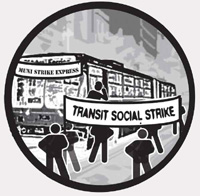Muni fare strike urged by activists - Bus and train riders should refuse to pay Sept 1, 2005
Submitted on Tue, 08/30/2005 - 3:14pm
Disclaimer - The following article is reposted here because it is an issue with some relevance to the IWW. The views of the author and the publisher do not necessarily agree with those of the IWW and vice versa.
Rachel Gordon, San Francisco Chronicle Staff Writer - Tuesday, August 30, 2005 - Original Article.
 A coalition of activists involved in left-leaning political causes in San Francisco called on Municipal Railway passengers to refuse to pay their fares starting Thursday, the day the price for a ride is set to go up.
A coalition of activists involved in left-leaning political causes in San Francisco called on Municipal Railway passengers to refuse to pay their fares starting Thursday, the day the price for a ride is set to go up.
"We refuse to pay more for less service," said Riva Enteen, one of the organizers of the planned strike who publicized their plans at a Mission District rally Monday. "These fare hikes will affect poor people the most."
Starting Thursday, the regular cash fare for bus and train service will go up to $1.50, a 25-cent boost, and the cost of a cable car ride will nearly double to $5. The cash fare for seniors, the disabled and youth will increase 15 cents, to 50 cents.
City officials approved the fare increase -- the second since 2003 -- to help plug a $57 million hole in Muni's budget. The cost of the monthly Fast Pass will remain at $45. But cash fares will go up.
The city-run transit agency also is preparing to cut service at the end of the month, which will result in riders having to wait between one and five minutes longer for buses along certain routes. The changes come as Muni is still struggling to reach an on-time goal of 85 percent for its fleet of buses, trolleys and railcars set by voters in 1999.
Some critics are saying enough is enough, and Monday they rallied support for a fare strike. The move comes after they failed to stop the increase during budget deliberations at City Hall earlier in the summer.
The activists -- from such groups as the Gray Panthers, St. Peter's Housing Committee, the San Francisco Day Labor Program and People United to Win Employment Rights -- are urging Muni passengers to stop paying any fares at all starting Thursday.
If the strike works as organizers hope, Muni's revenue would drop and city officials would be forced to rescind the higher fares and look for alternative funding sources, such as higher taxes levied on downtown businesses to pay for transit
But Muni spokeswoman Maggie Lynch said what is more likely was that if fare-box revenue dropped, service would have to be reduced even more. As it is, she said, rising fuel prices have been hurting Muni's bottom line.
"To not pay your fair share would be unfair to others who do pay," Lynch said. "It will only make Muni's budget worse." She equated fare evasion to stealing.
The riders advocacy group Rescue Muni also opposes the proposed strike, saying it will hurt more than help.
Muni collects $140,000 to $170,000 a day through its fare boxes.
Passengers who refuse to pay their fare are subject to a $113.97 fine on the first offense.
"If people are caught, they will be issued citations,'' Lynch said.
Strike advocates, working with the National Lawyers Guild, have set up a legal team to help fare evaders beat the charge.
"Our legal team will do everything they can to get fare-evasion tickets dismissed, using the same legal techniques that lawyers use both when fighting traffic tickets and when defending people who engage in civil disobedience actions," states one of the coalition's flyers.
Even as Muni counts on the fare hike and service cuts to balance its budget, the San Francisco Planning and Urban Research Association warns in a new report set for release Thursday that more of the same may be needed in the near future without a thorough overhaul at the transit agency to improve efficiency and attract more riders.
With 700,000 boardings a day, Muni already is the busiest transit agency in the Bay Area, but ridership has been in decline.
Most of the regulars who ride Muni -- about 60 percent -- use Fast Passes and will not be affected by the fare increases, Lynch said.
However, said housing activist Luis Herrera, one of those pushing for the strike, a lot of people, among them the working poor and seniors on fixed incomes, don't buy Fast Passes and will feel the pinch. "Poor people are finding it harder and harder to live in San Francisco,'' Herrera said.
E-mail Rachel Gordon at [email protected].
Find out more about the Muni Social Strike - www.socialstrike.net